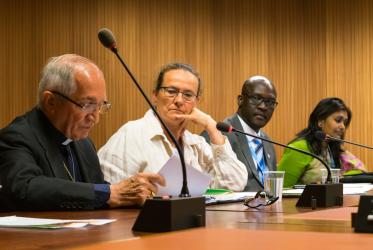Displaying 41 - 60 of 70
09 February 2017
Plans for 2017 decided by WCC Executive Committee
01 December 2016
WCC Executive Committee issues statement on climate justice
25 November 2016
GEM school ends with hope for a better tomorrow
08 September 2016
A just financial and economic architecture is possible, students find
08 September 2016
Winners of WCC photo contest announced
09 May 2016
Consultation considers right to food in context of climate change
15 December 2015
Interfaith workshop calls for justice and compassion in finance
03 December 2015
Climate pilgrimage toward COP21 pauses in Geneva
05 November 2015
Weaving together personal faith and climate change
23 September 2014
Prayers, reflections and action during “Time for Creation”
15 September 2014









